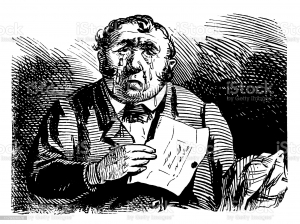MONTHLY BLOG 148, Tracking down Eighteenth-Century Optimists and Pessimists in order to write The Georgians
If citing, please kindly acknowledge copyright © Penelope J. Corfield (2023)


| Image 1 Laughter, being detail from Hogarth’s Laughing Audience (1733); and Image 2 Tears, being early C19 cartoon in Getty Images 1179326076 |
This BLOG is also published on Yale University Press website:
https://yalebooksblog.co.uk/2023/03/23/eighteenth-century-optimists-and-pessimists/
Many people have asked, since the publication of my book on The Georgians1 , why I note on the dust-cover that I am an optimist. There is a reason (apart from the fact that it’s true). But to explain, I need to take a step back. So please bear with me while I tell you first about how I decided to introduce my cast of eighteenth-century Britons.
While studying this fascinating and formative period of history, I long pondered how to start my book. In fact, I begin by defining my operative dates and my choice of book title. Then I quickly outline where the Georgian Britons lived – and in what numbers. But what then? I did not want to proceed with well-known stories about great men or great battles or great inventions – though all those things do come into the analysis at suitable points.
So I decided to provide a cultural overview of what people in the eighteenth century thought of their own era. Obviously, the surviving evidence came chiefly from the literate, who were able to record their views – although I also take note of popular songs and sayings. But I searched widely among the less well known and the completely unknown, as well as among the famous. It was the equivalent of tapping into Georgian journalism, both reflecting and trying to influence contemporary attitudes.
And the method that I used was to collect all the eighteenth-century statements that I could find, which took the form of a dictum: ‘It is an age of xxx’ (a common formulation) or a ‘century of xxx’. All these commentaries had to be made in the moment and of the moment. I was not interested (for this purpose) in people’s retrospective verdicts. But I wanted to know what they thought at the time – without any fore-knowledge of the outcome.
It took me years to amass a collection; but there was great fun in the search, as I looked into eighteenth-century novels, plays, poems, letters, diaries, guide-books, journalism, sermons, songs, sayings, and so forth. Usually, the quest was carried on alongside my ‘normal’ research. And it had the very good effect that I always kept my eyes open and was never bored.
Eventually, I had amassed over 700 ‘ages’, from contemporary observers from the mid-seventeenth century up until the present day (2023). Several hundred of them came from Georgian Britons. I then set myself, without any pre-set assumptions, to review and classify them.
A fairly sizable group defined the times in terms of material goods. And that category became more and more notable in the course of the later nineteenth and twentieth centuries. Thus it’s no surprise to find people writing about ‘a telegraph age’ (1868); ‘the age of television’ (1958); ‘the computer age’ (1963); ‘the age of electronic messages (1990); and so forth. (Note that these claims indicate when innovations were noted, not literally their first invention).
Were there equivalents in the eighteenth century? Yes, there were. Thus an onlooker defined the era in 1736 ‘an age of Equipage’2 – the smart term for a coach and a team of horses; or in 1756 as ‘this age of Vauxhalls and Ranelaghs’,3 referring to the new vogue for attending public pleasure gardens.
But much the largest category throughout the collection was the one I classified as ‘mood’. Some of the most frequently repeated claims were those expressing doubt: as in ‘an age of uncertainty’; ‘an age of anxiety’; ‘worrying times’. One British commentator in 1800 was completely woeful: ‘Never was the world in so calamitous or so perilous a state as at this moment’.4 (Hard not to laugh; but it was written in all seriousness).
Other onlookers, meanwhile, were full of hope, detecting ‘light’; ‘improvement’; even ‘an age in which knowledge is rapidly approaching towards perfection’. (The last quotation came from the philosopher Jeremy Bentham in 1776, when in euphoric vein).5
Reviewing the gamut of ‘mood music’, it was clear that there was a systematic division between optimism and pessimism. Furthermore, while pessimists always remained vocal, the cultural predominance in Georgian Britain was increasingly tilting in favour of optimism. Eighteenth-century identifications of ‘progress’ in particular fields were becoming welded into the nineteenth-century cliché: ‘an age of progress’. One popular song, circulating in 1830, was full of excited anticipation about the march of inventions. It imagined that people could peep into the future, and the chorus urged:6
Open your eyes, and gaze with surprise
On the wonders, the wonders to come!
Details of these contrasting attitudes are explored in Georgian Britain, ch. 3 ‘Voices of Gloom’ (pp. 41-55); and ch. 4 ‘Voices of Optimism’ (pp. 56-70). The classification refers to viewpoints – not necessarily to individuals throughout a lifetime. Some people’s moods veered frequently. Yet these powerful and rival attitudes vividly introduced the adventurous times through which Britons were living – during an unprecedented era of exploration, spreading literacy, applied inventions, parliamentary rule, popular riots, religious pluralism, sexual frankness and experimentation, colonial acquisition, urban and commercial growth, rising global power – and participation in the contentious trade in enslaved Africans. (For more on all these themes, see within The Georgians).
Finally, having outed countless optimists and pessimists (and a few waverers in between),7 I thought that I should out myself as well. In fact, I am not a Panglossian – unlike the character in Voltaire’s Candide (1759), who believes that ‘All is for the best in the best of all possible worlds’. Yet I am psychologically with the growing Georgian mainstream. Let’s innovate for improvement; but, if generating errors (plenty of those in the ei ghteenth century, as the book explains), then let’s speedily reform. And, above all, let’s live with hope. A great motto in itself – and a crucial one for authors!
1 See P.J. Corfield, The Georgians: The Deeds & Misdeeds of Eighteenth-Century Britain (Yale UP, 2022; paperback 2023); and for associated website, entitled Georgian Witnesses, see: www.thegeorgiansdeedsandmisdeeds.com
2 Anon. [E. Jones], Luxury, Pride and Vanity, the Bane of the British Nation (London, 1736), p. 7.
3 J. Buncle [T. Amory], The Life of John Buncle, Esq: Containing Various Observations and Reflections … (London, 1756), Vol. I, p. 460.
4 J. Bowles, Reflections on the Political and Moral State of Society … (London, 1800), p. 128.
5 J. Bentham, A Fragment on Government (London, 1776): preface, opening sentence.
6 Song by W.H. Freeman, Three Hundred Years to Come (c.1835): see https://musescore.com/song/three_hundred_years_to_come_a_comic_song-2326061. One cheerful forecast was that future earthlings would be able to hitch a lift on a passing balloon to attend a party on the moon … Well, not yet!
7 For the debates, see variously T. Harries, The Rule of Optimism (London, 2022); E.C. Gordon, Human Enhancement and Well-Being: The Case for Optimism (London, 2022); but compare with R. Scruton, The Uses of Pessimism and the Dangers of False Hope (London, 2010); and M. van der Lugt, Dark Matters: Pessimism and the Problem of Suffering (Princeton, NJ., 2021).
For further discussion, see Twitter
To read other discussion-points, please click here
To download Monthly Blog 148 please click here






